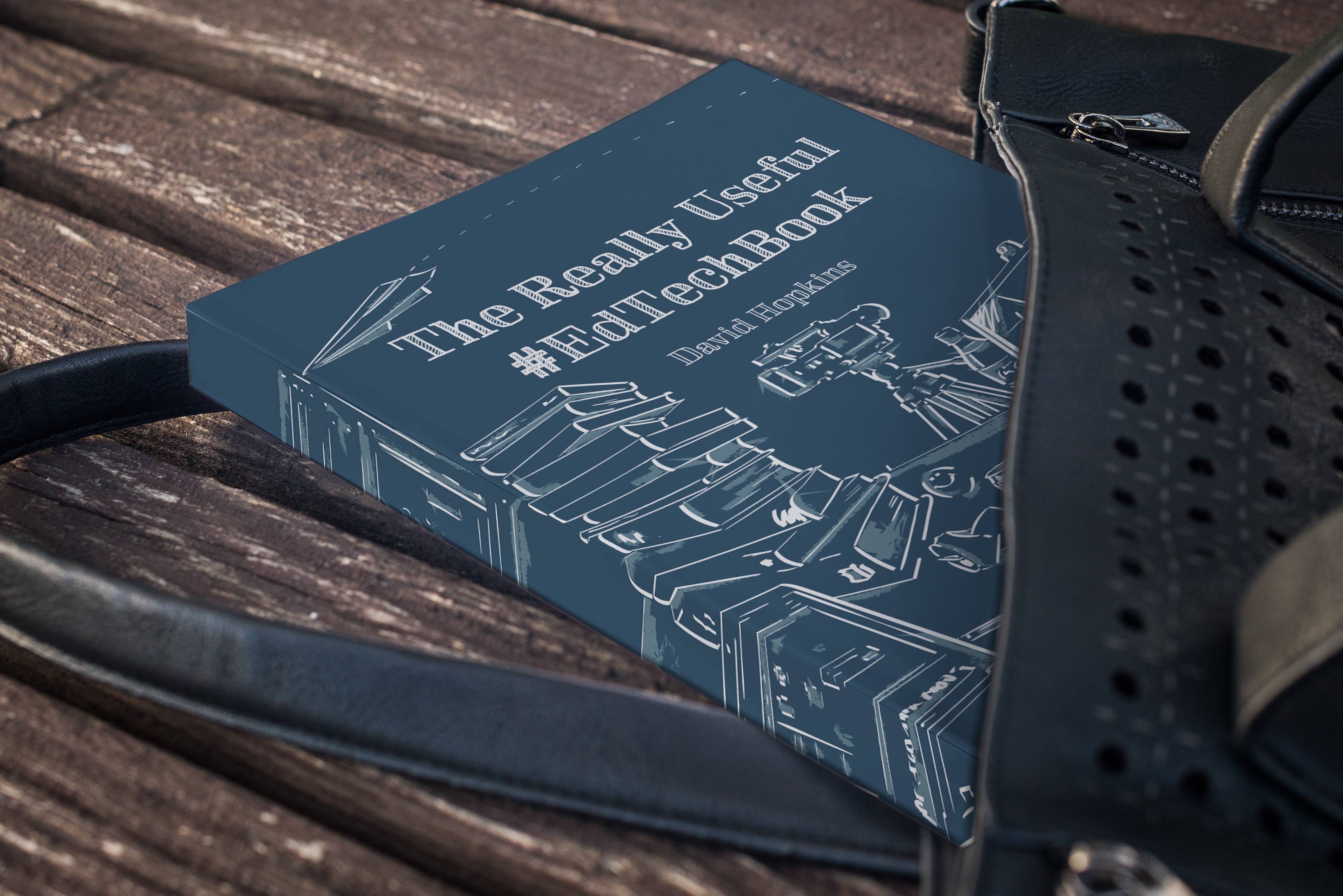 I’ve had the pleasure of witnessing an impressive collaborative authoring project during the past several months. A group of 15 dynamic and talented EdTech professionals — coordinated by the dynamic and talented David Hopkins — has just published The Really Useful #EdTechBook. As described by David, the book is about “the experiences, reflections, hopes, passions, expectations, and professionalism of those working with, in, and for the use of technology in education” — mostly in higher and further education, but also in primary schools and various workplaces. The authors draw on their own experiences, supported both by research of their own as well as existing research in education, education technology, pedagogy, creativity, and innovation.
I’ve had the pleasure of witnessing an impressive collaborative authoring project during the past several months. A group of 15 dynamic and talented EdTech professionals — coordinated by the dynamic and talented David Hopkins — has just published The Really Useful #EdTechBook. As described by David, the book is about “the experiences, reflections, hopes, passions, expectations, and professionalism of those working with, in, and for the use of technology in education” — mostly in higher and further education, but also in primary schools and various workplaces. The authors draw on their own experiences, supported both by research of their own as well as existing research in education, education technology, pedagogy, creativity, and innovation.
I was delighted to be asked to write the foreword for the book, which you can find below.
The book is for sale now — the official launch date is January 28th. Please check the #EdTechBook hashtag, or the link to the book above, for more information. Excellent blog posts also have been written by many of the contributors, including Sharon Flynn, Sheila MacNeill, Sue Beckhingham, and others. I believe it will be a rich resource for many.
Foreword
“Dialogue cannot exist in the absence of a profound love for the world and for people.” – Paulo Freire
Fires rage all around us in education today. As educators we face many familiar challenges, some of which have taken on new forms in recent years. What is the purpose of education, of further and higher education? Who should fund it? Who benefits? Where does learning happen? What role could and should technology play? Whose technology? At individual and institutional levels we face new challenges also. Among these: How best can we support learning in a landscape in which the boundaries between formal and informal learning are blurring? How do we support networked learning in the age of surveillance? How do we, and our students, effectively manage our data, our privacy, our digital identities?
Your work will no doubt be affected by many of these challenges – whatever your discipline, your education philosophy, your politics, or your role. And it is these challenges which inform much of the work of learning technologists.
The role of the learning technologist, particularly in further and higher education, is relatively new and has evolved considerably in its short history (Conole, 2004; Hopkins, 2013; Oliver, 2002). This volume is authored by a diverse group of learning technologists who share their experiences of and reflections on their work. More importantly, however, they reveal much about their individual approaches to learning and teaching, to technology, to change, and to the future. The authors define themselves variously as learning technologists, educational developers, digital pedagogues, lecturers, and consultants. What unites them, however, is a collaborative and cross-disciplinary approach to curriculum development, and to professional and personal development. This is, at its simplest, a collection of articles by learning technologists. But the collection is also a live network of trusted and generous education professionals, each of whom describes their own learning as well as how they collaborate and support learning at their institutions. The Freirean spirit is evident here in the critical questioning and dialogic approach; in the joy and love of learning and of people.
There is plenty of polemic today about how technology could and should be used in education, and no shortage of criticism about how it is being used. This volume is neither. The collection is a resource for anyone interested in the use of technology in education and learning, authored by those responsible for the messy reality of “managing, researching, supporting or enabling learning with the use of learning technology” (ALT, 2010). The authors draw on their own experiences, supported both by research of their own as well as existing research in education, education technology, pedagogy, creativity, and innovation.
I am not a learning technologist. But like many of the contributors to this collection I consider myself an open educator, committed not just to open educational resources (as this book will be), but to open teaching, open thinking, and open learning. I invite you to dive into this volume, as I have done, with that spirit. Read about approaches that you agree with, as well as approaches with which you may disagree; read about work that is familiar to you, as well as work that is new to you. I join each of the authors in hoping that these contributions will form part of a wider and ongoing discussion about technology, learning, and the future of education.
References
ALT. (2010). What is learning technology?
Conole, G. (2004). The role of learning technology practitioners and researchers in understanding networked learning. Proceedings of the Networked Learning Conference 2004, Lancaster University, UK.
Freire, P. (1970). Pedagogy of the Oppressed. London: Penguin.
Hopkins, D. (2013). What is a Learning Technologist? 1st edition.
Oliver, M. (2002). What do learning technologists do? Innovations in Education and Training International, 39(4), 245-252.
Image source: David Hopkins, Flickr. The Really Useful #EdTechBook